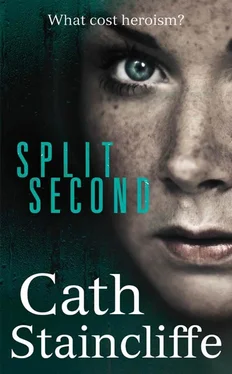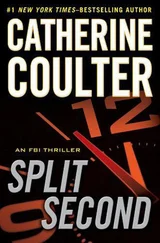Grandma and one of the other women had done the design: a frieze of figures along the bottom, holding symbols: flowers, sheaves of wheat, paintbrushes, a kite, tools. The words unity , freedom , peace repeated around the edges of the cloth, and in the centre the name of the branch, each dot above the ‘i’ a small hammer and sickle. Along the bottom they had sewn thick, gold-coloured upholstery fringing. Carried on dark wooden curtain poles up either side, the banner was so heavy when it was done that they needed harnesses to strap round the waists of the bearers. It was beautiful.
Louise carried on sewing for a few years. Her grandma had always done it; even Louise’s mother, who couldn’t boil an egg, could turn her hand to alter a dress, tart it up with a nip and a tuck and a sprig of lace or fresh buttons. Louise made cot quilts each time she was pregnant. She didn’t bother with sewing now, not beyond a bit of mending or the odd costume for Ruby’s school plays and fancy-dress parties, though she still had the rag-bags shoved in the roof space and the old Singer taking up space in the under-stairs cupboard. Nowadays it cost more to dress-make than getting something new. Clothes were that cheap. Unless you recycled stuff. She quite liked the idea. Some people made a living doing it, creating unique clothes, but Ruby wouldn’t wear anything second-hand.
She got to her feet and the floor pitched, her head swam; she used the furniture to balance until the vertigo eased. They should get back to the hospital. She went to wake Ruby and put some bread in the toaster. The smell made her mouth flood with saliva and she thought she’d retch, but she breathed carefully, resisting the impulse. She buttered a slice for herself; she had to eat something. She’d be no use to anyone half starved.
Andrew
They lay on the twin beds, which were pushed together in the guest room. Almost as large as the master bedroom, it had been Colin’s room when they were kids. Andrew, as the youngest, had the box room next to Colin’s.
In the intervening years it had been repapered and spruced up, the old sash windows replaced, a new carpet fitted. A few remnants of childhood stood on the alcove shelves, amusement for visiting grandchildren: dominoes and a game of Mousetrap, a set of Russian stacking dolls (who on earth had bought them?) and a box of Dinky cars and tanks and lorries.
The curtains were drawn, the radiator ticking. The room was airless, hot and stuffy. Andrew could smell food cooking downstairs. They lay on top of the covers, like spoons, her back to him, his arm across her side, holding her wrist.
‘The other boy’s been in surgery,’ Val said. ‘Head injury.’
‘Oh God!’ Andrew felt a gout of shame; he hadn’t thought to ask the police about him – presumably that was how Val knew.
‘He’s still unconscious so he’s not been able to tell them anything. It’s a miracle he survived, the way they-’ She broke off.
Andrew exhaled. ‘You don’t have to.’
‘It’s important I remember,’ she carried on, withdrawing her arm. ‘I heard shouting. I went to the window first; I could see there were people, but not what was going on, not clearly. I think I knew it was a fight. I went to the front door. It was all so quick. One of them was on the ground and the others were kicking him.’ Her voice shook. ‘They were all doing it, even the girl.’
Andrew gave a ragged sigh.
‘And Jason was coming in the gate, he was shouting, he was frantic. I just wanted him to come inside, to get away. That awful feeling, you know, when you see that sort of violence, like we’re animals, just animals. All the instincts kicking in. I was so scared, I was shouting, there was so much noise. Then he pulled one of them off, the biggest one, grabbed at his shoulders. The boy just pushed him over.’
Andrew felt his own limbs rigid with apprehension.
‘Jason grabbed the lantern stand; you know the cast-iron one near the snowberry bush. He went for the same boy, hit his back; that’s when I ran in for the phone. Went upstairs to get you. I never saw a knife. Oh God,’ she wept, and Andrew felt the tremors deep in his own belly. He smelt her hair, faint traces of shampoo and a hint of the perfume she always wore.
‘He was so brave,’ she said, her voice clotted with tears. ‘Why did he have to be so bloody brave?’
Andrew was running, sliding, skittering, ice underfoot. He woke sweaty, breathless, after the dream. The shapes of it dissolving, drifting as he tried to clutch at them. The story of it lost, but a sour, squalid residue in the pit of his stomach.
Jason! For a moment, a delicious, delirious moment, he willed that the loss of Jason was a dream too, that any time now he would open his eyes for a second time to his own bedroom and the sound of his son crossing the landing and all the bright possibilities, the glorious mundanities of a normal day. But the hope shrivelled, the edges of the picture flaring and charred. Ashes and blood.
He felt overloaded; the weight was crushing him, compacting his bones and the marrow within, compressing his vital organs, lungs, liver, heart.
Val was there, and the family liaison officer, Martine. Andrew’s mother offered toast and tea. Tea, he agreed, and pulled out a chair. Val had a pad of paper in front of her, a laptop open.
‘How are you?’ his mother asked.
Andrew shrugged, rubbed at his face. He hadn’t shaved, hadn’t washed.
Martine explained apologetically that the investigating team needed statements from them both. She knew it was a terrible time, but it was crucial to do it as soon after the incident as possible. She could take them to the station and bring them back. Was that okay?
Outside the station, Andrew was appalled to see Jason’s photo, the one from YouTube, and the word MURDER in dense black capitals. He wanted to run, to scuttle off and burrow somewhere. He squeezed Val’s hand. The place was deserted. Martine pressed an intercom and gave her name to gain entrance, and then they all waited by the empty front desk until someone appeared. Andrew sat and watched the screen fixed high on the wall as it switched between views of the car park, which must be behind the building, the outside approach to the main entrance and the reception area itself. Showing them on the camera: Val, preoccupied, quiet, one hand supporting her head, eyes half closed; Martine, smart and trim and alert; and himself, unfamiliar, nondescript. A bloke, just some bloke.
‘Mr Barnes? Mrs Barnes?’ Introductions, handshakes, then Martine and Val went one way and a policeman called Neville Long settled Andrew in a meeting room. It was kitted out with sofas and easy chairs, rugs and coffee tables. No posters on the walls; just prints, wispy landscapes.
Neville Long was a bulky man with a full beard and large plump hands, tiny feet, Andrew noticed, really small. Small as Val’s? Jason was a 12, bigger than Andrew, who took size 10.
‘Mr Barnes.’
‘Sorry.’ Had he missed something? ‘My concentration…’
‘When did you last eat?’ the man asked him.
‘I’m not hungry.’
‘Have some tea.’
‘I don’t…’
‘Try.’
He went off and came back carrying a tray with two mugs of tea and a plate of mince pies.
‘Please help yourself.’ Neville Long took a mince pie, prised it out of the foil case and bit into it. Pastry crumbs scattered on the coffee table. He adjusted a file on his knee. ‘I want to take a formal witness statement, get all this down in writing. Yes?’
Andrew nodded.
‘Then we’ll look at what you can give us in the way of detailed descriptions. Perhaps you can start by telling me in your own words exactly what you saw.’
‘I was in the shower,’ he began. He felt the lump in his throat, the band tighten on his Adam’s apple. He shifted, coughed and dragged the sounds out, every sinew in his body stretched taut, his muscles rigid. His account was halting, trying to convert the slideshow in his head into phrases and sentences. ‘And then?’ the detective kept prompting. And then? And then? And then? Until he had forced Andrew out into the snow and that ghastly mess on the ground, down the street after them and back to Jason’s anguish, I think he’s dead , and into the living room and Jason pale, swaying, Andrew knowing he was ill, Jason falling, blood on his coat, all the way to the quiet hospital room where his son’s body was laid out.
Читать дальше












